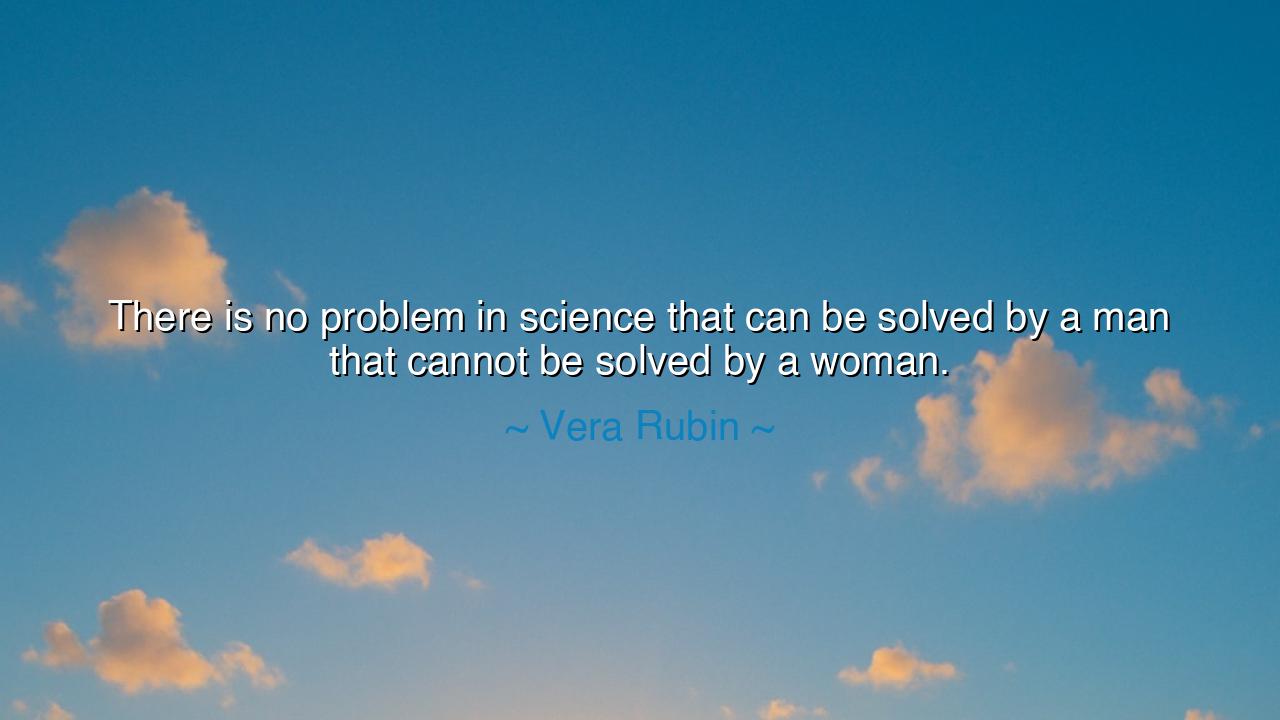
There is no problem in science that can be solved by a man that
There is no problem in science that can be solved by a man that cannot be solved by a woman.






"There is no problem in science that can be solved by a man that cannot be solved by a woman." These words, spoken by the brilliant Vera Rubin, carry a profound and empowering truth: that science, at its core, is not bound by gender, but by curiosity, intellect, and determination. Rubin, a trailblazer in the field of astronomy, challenges the age-old misconceptions that have sought to limit the reach of women in intellectual and scientific pursuits. Her statement is not merely a declaration of equality, but a celebration of the boundless potential of the human mind, regardless of the body it inhabits. In the pursuit of knowledge, it is not one's gender that defines ability, but the spirit and resolve to seek truth.
In the ancient world, wisdom was often seen as a realm dominated by men—philosophers, mathematicians, and scientists like Pythagoras, Plato, and Aristotle stood at the forefront of human thought. Yet, even in those times, there were women who defied the norms and made significant contributions to knowledge. Hypatia of Alexandria, the philosopher and mathematician, was one of the most remarkable figures of her time, a woman who taught and wrote extensively on astronomy, mathematics, and philosophy. Hypatia was a beacon of intellectual brilliance in an era when women were largely excluded from the academic world, yet she stood as a testament to the idea that the mind—whether male or female—has the potential to unravel the mysteries of the universe. She exemplifies the truth that Rubin would later articulate: science is not confined by gender, but by the courage to question and the vision to explore.
Consider, too, the story of Marie Curie, whose work in the fields of radioactivity and physics reshaped the scientific landscape. Curie, despite facing tremendous adversity and prejudice due to her gender, became the first woman to win a Nobel Prize and remains the only person to have won Nobel Prizes in two different scientific fields. Her tireless dedication to science and her unparalleled intellect shattered the barriers that sought to prevent women from participating in the pursuit of knowledge. Curie’s achievements embody the spirit of Rubin’s words: no scientific problem is beyond the grasp of a woman if she has the will and the intellect to confront it. The human spirit is not constrained by gender, but by the strength of the mind and the determination of the individual.
In modern times, Vera Rubin herself is a shining example of the power of women in science. She is best known for her groundbreaking work on galaxy rotation curves, which provided critical evidence for the existence of dark matter—one of the greatest discoveries in modern astronomy. Rubin faced significant obstacles in a male-dominated field, yet her perseverance and brilliance allowed her to push the boundaries of scientific knowledge. Her work not only changed the way we understand the universe but also paved the way for future generations of women scientists to follow in her footsteps. Rubin’s achievements stand as a living example of the truth that scientific inquiry is not limited by the gender of the seeker, but by the strength of their curiosity and their commitment to uncovering the unknown.
The lesson to be drawn from Rubin’s words is one of empowerment and equality. Science, at its core, is an endeavor that transcends all boundaries—gender, race, or social standing. It is driven by the pursuit of truth, the quest to understand the universe and our place within it. To limit the participation of any person in this endeavor is to rob humanity of the full breadth of its potential. In every corner of the world, there are brilliant minds—women and men alike—who can unlock the mysteries of the universe, if only they are given the opportunity to do so. It is up to each of us to recognize this truth and to create a world where curiosity and intellect are nurtured, regardless of gender.
In our own lives, we must act as advocates for equal opportunities and recognize the contributions of all those who seek to understand the world around them. Let us support women and men alike in their pursuits, whether they are in science, art, or any other field. Let us encourage young minds, regardless of their gender, to ask questions, to explore, to push the boundaries of knowledge, and to reach for the stars. In doing so, we honor not only Vera Rubin and the many other women pioneers who have shaped our world, but we also ensure that future generations will inherit a world where the pursuit of truth and understanding is open to all, regardless of who they are or where they come from.
Rubin’s statement is a call to action—a reminder that knowledge and science belong to all of humanity. The obstacles of the past are not barriers for the future, and with perseverance, determination, and vision, there are no limits to what we can achieve. We must all take up the mantle of curiosity and discovery, united in our shared pursuit of understanding. For in the quest for truth, there is no room for inequality. The mind, in all its power, is a tool for all to wield.






AAdministratorAdministrator
Welcome, honored guests. Please leave a comment, we will respond soon